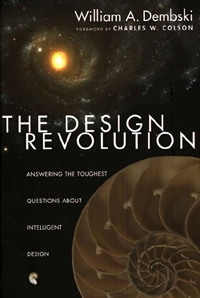This is a recent online exchange I had with a Christian who is a theistic evolutionist. I want to say up front that I do not accept evolution as a reasonable explanation for the existence and variety of life we observe for scientific and theological reasons. I do not doubt that it has explanatory power on the micro scale as in how organisms adapt and change over time but it is not convincing at all for the variety of species we observe. That being said, in this discussion I did not dispute evolution (I just granted it for the sake of argument) but I responded to the theistic evolutionist’s denial of intelligent design. There is really no coherent reason I can see for a confessing Christian to fight against ID as a theory.
Many of the top scientists in the intelligent design community like Dr. Michael Behe do believe in common ancestry and evolution but they deny that randomness explains the process:
By far the most critical aspect of Darwin’s multifaceted theory is the role of random mutation. Almost all of what is novel and important in Darwinian thought is concentrated in this third concept.[1]
In fact, Darwinian orthodoxy holds that natural selection and random mutations explain the existence of all life forms. This seems completely at odds with biblical theism. An intelligent design position seems to me to be a bare minimum even if one does hold to theistic evolution. According to William Dembski a pioneer of ID:
Intelligent design is the science that studies signs of intelligence. … What makes intelligent design so controversial is that it purports to find signs of intelligence in biological systems. According to Francisco Ayala, Charles Darwin’s greatest achievement was to show how the organized complexity of organisms could be attained without a designing intelligence. Intelligent design therefore directly challenges Darwinism and other naturalistic approaches to the origin and evolution of life. … As a theory of biological origins and development, intelligent design’s central claim is that only intelligent causes adequately explain the complex, information-rich structures of biology and that these causes are empirically detectable. [2]
Notice that the principle point is one of intelligent causation as opposed to a random one. This is my bone of contention with the theistic evolutionist. Anyhow, here is the conversation taken verbatim from an apologetics discussion board. TE is the theistic evolutionist ( I preserved his privacy). CDP is me (STR fans, observe how I used my Tactics).
—————————————————————————————————————————————————————–
TE: I am not saying ID is not science because it is religion. I am saying it’s not science because it’s false, in light of the evidence. Since the motivation behind ID is obviously religious, it ought to be taught in the forum, rather than conveying the false message that it is as legitimate as evolution
CDP: Forgive me but I am confused, you do not believe God designed life? So you are an atheist?
TE: I shall leave it to anyone posting to point out where I even implied that I was an atheist.
CDP: Sorry, I am just trying to get some clarity, are you a deist then?
TE: I shall leave it to anyone posting to point out where I even implied that I was a deist. Cris, evolution does not disprove God. It does not force one to be a deist. There are plenty of theistic evolutionists, many of whom are Christians.
CDP: But even theistic evolutionists believe that God designed life. If you deny God designed it then that is deistic evolution by definition.
TE: When did I ever say that God did not design life? When did I ever say that God did not create life?
CDP: Oh so then ID is not false then?
TE: If by ID you mean God CREATED life, then no. If by ID you mean natural selection and random mutation are not sufficient explanations for how complex structures arise once life already exists, then it is false. Evolution is not an explanation for the origin of life. It is an explanation about what happens once life already exists
CDP: Theistic evolution usually holds that God designed and front loaded that design into life to realize his design.
TE: For example, it’s perfectly consistent to deny abiogenesis and be a proponent of evolution by natural selection and random mutation. I think it is much harder to support abiogenesis.
CDP: I’m talking about design not the origin of life. It seems to me that if you believe that natural selection and random mutation explain all species, complex structures and that God did not plan any of it then you are a deist by definition.
TE: That’s not true. Especially since it’s perfectly possible for God to have created life KNOWING the outcome, as any omniscient being would. Moreover, I believe God used evolution as the mechanism by which certain species arose. Remember, if God exists, natural selection would be the ultimate miracle, right next to the creation event, especially if NS and the Big Bang were God’s mechanisms.And I’d be careful about arguing for an inconsistency between evolution and Christ. A lot of people would lose their faith before they would give up their belief in scientific fact.
CDP: If he knows the outcome that is design and things evolved by design and not by randomness. Inconsistency seems to be your problem; if God planned the outcome then randomness is not in the equation and intelligence is. You want to have it both ways.
—————————————————————————————————————————————————————–

I cannot understand how any theist can be against intelligent design. Intelligent design does not deny the evolutionary process but it objects stridently to the mechanism of randomness. Theistic evolutionists who pander to the naturalist worldview by using arguments like the above are holding contradictory views. Either God intended a certain outcome or it was the result of randomness. Both cannot be true. The only possible escape from the cognitive dissonance would be to embrace a radical form of open theism or process theology in which God is just figuring things out as he goes. But even open theists would argue the creation of man must have been intentional (i.e. by design). Appealing to randomness to explain how complex structures arose seems to me to be deism at best.




